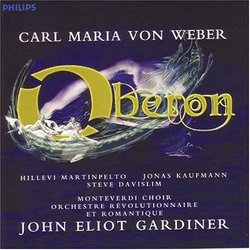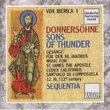| All Artists: Carl Maria von Weber, John Eliot Gardiner, Orchestre Revolutionnaire et Romantique, Monteverdi Choir Title: Weber: Oberon Members Wishing: 0 Total Copies: 0 Label: Philips / Decca Original Release Date: 1/1/2005 Re-Release Date: 8/9/2005 Genre: Classical Style: Opera & Classical Vocal Number of Discs: 2 SwapaCD Credits: 2 UPC: 028947565635 |
Search - Carl Maria von Weber, John Eliot Gardiner, Orchestre Revolutionnaire et Romantique :: Weber: Oberon
 | Carl Maria von Weber, John Eliot Gardiner, Orchestre Revolutionnaire et Romantique Weber: Oberon Genre: Classical
|
Larger Image |
CD DetailsSimilar CDs
|
CD ReviewsWHAT IS THIS LIKE? DAVID BRYSON | Glossop Derbyshire England | 07/04/2006 (5 out of 5 stars) "Weber does not really have as clear a `profile' or identity for the musical public as composers of similar stature, say Schumann or Chopin or Berlioz, have. Knowledge of his work (my own included) is usually patchy. As far as his operas go, even those of us well familiar with Freischuetz and Euryanthe rarely know Oberon, and this is not surprising since, as Gardiner says, it was thought all but unstageable throughout the 20th century. During the first half of the 20th century Handel's operas were viewed in much the same way. We are learning better now, and it's time to think again about Oberon as well. There is a really excellent liner booklet accompanying this set containing thoughtful and informative essays both by Gardiner and by Richard Wigmore. Wigmore quotes some of the more unflattering comments on Planche's libretto, including Tovey's dictum that it is `the merest twaddle'. I will venture to take a different view and say that in my opinion it is really quite good. I read it as a pantomime book, and read like this it is certainly a lot more coherent and sequential than the libretto of The Magic Flute. I think I find a good deal of tongue-in-cheek whimsy in the vagaries of the plot, and if I'm right Planche has really had the last laugh on Tovey and the others. For this performance, sung in English, Gardiner has had the excellent idea of connecting the musical numbers with a spoken narrative, read by Roger Allam. Gardiner has written this narrative himself, and he needs to be complimented on the way he has caught the Christmas-pantomime idiom. As for the music, it doesn't recall The Magic Flute to me nor indeed anything by Mozart, to whom Weber was related by marriage. The fairy music stands comparison with Mendelssohn's, but you would never mistake it for Mendelssohn's. This is the familiar Weber of Freischuetz and Euryanthe, and that ought to be commendation enough. Weber was a melodist to rival Berlioz and even Verdi himself. Searching for comparisons, I thought momentarily of Verdi's Il Corsaro with its parallel theme of the rescue of a captive princess from a wicked Caliph, but that comparison goes nowhere, or only as far as that both composers were born theatrical dramatists. The comparison with Schumann's Manfred probably has more going for it, even though Schumann had no theatrical sense whatsoever. What the two works have in common is the treatment of the supernatural in early romantic English literature and the way German composers of the period handled it. Looking forward rather than back, I can't say I find much foreshadowing of Wagner. What I do find is strong suggestions of one of Brahms's least-known and finest masterpieces his dramatic cantata Rinaldo, the very work in which I first heard and admired the tenor Steve Davislim who sings the part of Huon here. Weber can stand on his own feet. I love his heavenly lightness of step and lightness of touch. His orchestral writing was praised by no less a virtuoso of that art than Berlioz, and his melodies sing for themselves. Both the performance and the recording here strike me as first class. You will need a fairly high volume-setting, and the singers are not brought artificially close to the microphone. Davislim has the biggest part and that suits me very well, but at this early stage I have not noticed any weaknesses at all among the soloists, who might all be native speakers of English as far as elocution goes. The chorus is, very properly, a small one, with corresponding benefit to their clarity of diction too. The orchestral players perform with both fire and refinement, and Gardiner's love of the beautiful score is as apparent from his direction as it is from his commentary. The composer died aged 40 shortly after the first performance of Oberon, a victim of consumption as Chopin would be some years later. There is not the smallest shadow of death over his last score, and indeed his music seems to me to be a celebration of life as very little other music can be said to be to the same extent. I for one am more than glad of this opportunity to visit one of his neglected monuments, which I expect to do frequently. The year 2006 is now half-way advanced, and I have no way of knowing what my greatest musical discovery may be by the time it has run its course, but this one is going to be hard to surpass." A triumphant resurrection! Robert Heath | Lyon, France | 12/28/2005 (5 out of 5 stars) "This is not an opera and should be considered as belonging to a different genre almost by itself. Weber's music is startlingly beautiful. The cast is highly accomplished and the Monteverdi Choir true to form. The interpretation is exquisite and the remarkable dynamics obtained from singers and musicians alike are faithfully captured by a successful recording. Gardiner and the Orchestre Révolutionnaire et Romantique reproduce the excitement of a work that marks the transition from the classical to the romantic style. It's not hard to imagine why the première in 1826 at Covent Garden's Theatre Royal caused so much excitement." This is Jonas Kaufmann's show! Ralph Moore | Bishop's Stortford, UK | 08/20/2006 (4 out of 5 stars) "Forgive me if I correct the review by my compatriot, David Bryson, by pointing out that the main tenor role of Huon is taking by that excellent German tenor Jonas Kaufmann, whom I heard in Puccini's "Rondine" last year and found very impressive, with a baritonal quality that does not impede the projection of a ringing top. Steve Davislim sings Oberon - very well, but his is a smaller, lighter, neater voice, As in his otherwise very informative and intelligent review, Mr Bryson does not consider the singers, I would add that while he is right that the English even from non-native speakers is excellent (both Kaufmann's and Martinpelto's being virtually impeccable), the exception is the attractively voiced Marina Comparato as Fatima - but her accent matters little as she is playing an "exotic" role: an Arabian maid. Orchestral playing, sound, production, the narrator's delivery of Gardiner's link narrative: everything works to make this work not a hodge-podge but a coherent, entertaining whole, show-casing some delightful music - albeit bewilderingly disparate in its synthesis of different styles. The only slight disappointment comes in Martinpelto's rendering of the showpiece aria "Ocean, thou mighty monster"; she simply hasn't the heft of voice to do it full justice but it is nonetheless an attractive performance."
|

 Track Listings (24) - Disc #1
Track Listings (24) - Disc #1

